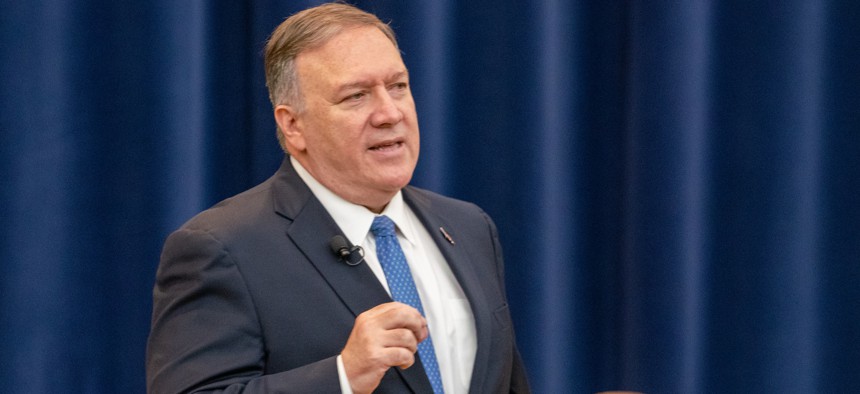Analysis: Mike Pompeo Is Bigger Than the Pentagon — For Now
“I think that Pompeo is now running foreign policy in the Trump administration in the way that Cheney ran it in the Bush administration,” said one analyst.
In the nine months since Jim Mattis resigned as defense secretary, one man has become the public leader of President Trump’s national security policy: Secretary of State Mike Pompeo. In the absence of a confirmed leader at the Pentagon, Pompeo had been unusually visible in public scenes — and decisions — typically associated with the secretary of defense.
And with President Trump’s unceremonious dismissal of National Security Advisor John Bolton, this week, some are comparing Pompeo’s outsized influence to Dick Cheney’s unusually powerful role running security policy as vice president for George W. Bush.
What’s still to be determined is how much power Mattis’s replacement, Defense Secretary Mark Esper, will be able to wield in the administration — and how much independence and influence he may have in the Oval Office with this president, and Pompeo at his side.
Pompeo, a former Army cavalry captain who often uses military-tinged terms like “mission set” to describe diplomatic activities, has been Trump’s prime deliverer of tough rhetoric against the Iranian regime. He has, for example, often warned that the president will not tolerate Tehran’s terrorism-related activities in the Middle East. That’s a normal role for the nation’s top diplomat.
But this summer Pompeo also emerged as one of the architects of the U.S. attempt to build an international maritime security operation to deter Iran in the Gulf. A department release in July said that he had “dispatched” Joint Chiefs Chairman Gen. Joseph Dunford to Kabul to discuss peace in Afghanistan — something that at least institutionally, he does not have the authority to do. Perhaps most symbolically, on Saturday Pompeo traveled to Dover Air Force Base in Delaware to meet the body of an American soldier slain in Afghanistan. The secretary of state does not usually participate in the military’s dignified transfer of remains ceremony.
Longtime Pentagon watchers say Pompeo’s actions are not, in themselves, unusual. Secretaries of State are often openly engaged in policy around combat theaters, said Loren DeJonge Schulman, a former defense hand at the Pentagon and the National Security Council during the Obama administration.
“What's unusual is Pompeo's comparative lack of activity in traditional diplomatic arenas,” said Schulman, deputy director of studies at the Center for New American Security. “The comparison between the two makes this stand out.”
Pompeo’s actions stand out, Schulman and others say, “because DOD was a silent player in the national security landscape” under Mattis, who was media-averse, and Patrick Shanahan, whom Trump kept on as acting defense secretary for more than six months until he was forced to resign in scandal, in July. The newly confirmed secretary of defense, Esper, graduated from West Point with Pompeo.
In an administration in which power is singularly concentrated in the chief executive — only Trump speaks for Trump — Pompeo is an unusually powerful figure. A former Tea Party congressman, his own views came already more-aligned with Trump’s than other now-departed national security hands like Mattis, Bolton, former Secretary of State Rex Tillerson and retired Lt. Gen. H.R. McMaster. He has outlasted almost every other cabinet-level national security official through an apparently unique talent to calibrate and carry out a mercurial president’s vision.
“I think that Pompeo is now running foreign policy in the Trump administration in the way that Cheney ran it in the Bush administration, which is to say that all foreign policy decisions seem to run through Pompeo regardless of whether or not they are supposed to,” said Mieke Eoyang, a former Senate and House national security staffer, now vice president at the centrist Democratic think tank Third Way. “He’s controlling the national security establishment in ways that not even [Vice President Mike Pence] can touch.”
Pence is seen even by critics of the Trump administration as serious about running a rigorous national security process, and speculation whirled early in Trump’s presidency that he would become the administration’s most prominent voice on foreign affairs. But despite Pence’s assiduous public loyalty — journalists remarked that Pence invoked Trump’s name 30 times during his February speech at the high-profile Munich Security Conference in Germany — more recent reports have suggested that the president is considering replacing him.
Pompeo’s authority appears poised to grow further in the wake of Bolton’s departure. Bolton, an experienced bureaucratic infighter, often clashed with Pompeo. The day Bolton was fired, the secretary of state emerged for a rare press briefing at the White House with a smile on his face. “There were many times Ambassador Bolton and I disagreed; that’s to be sure,” Pompeo said on Tuesday. “There were definitely places that Ambassador Bolton and I had different views about how we should proceed.”
Trump told reporters that when asked for Bolton’s resignation, “I told him, ‘John, there are too many people, you’re not getting along with people’” — a reference widely seen as referring to Pompeo.
Rumors have swirled in Washington that Trump could appoint Pompeo as Bolton’s successor, at least informally, or have him serve in both roles, a la Henry Kissenger under President Richard Nixon. Trump on Thursday said that he would not be naming Pompeo to the post, but “I wouldn’t be surprised if over the next few weeks and months, he de facto assumes” the role of national security advisor, said Rep. Julian Castro, D-Texas, a member of the House Intelligence Committee.
Spokesmen for both secretaries did not respond to a request for comment by the time this article was published.
The most powerful person on the president’s national security team is “Mark Esper, maybe, but Secretary Pompeo more so than any of the others,” said Rep. Mark Meadows, R-N.C., a close ally of the president who speaks to him frequently. “The president trusts him and he’ll heed his advice…They have a personal relationship besides a professional one and that serves him well.”
Arnold Punaro, a retired two-star Marine general and former Senate aide with deep ties in the Pentagon, said to give it time. He disputed the suggestion that Pompeo is eclipsing the defense secretary as the driver of security policy, noting that Esper has only a few months on the job, while Pompeo was confirmed almost a year and a half ago, “so the cumulative effect of Pompeo's visibility on the surface might appear to be more.” He added that the Pentagon has “always been and should be more measured in what they say publicly.” But, he said, “in terms of substance, the DOD leadership, I note from the announced White House schedules, meets with the president as much as does State.”
Trump has long had a fascination with the military, referring fondly in the early days of his presidency to “my generals”, turning Washington’s annual Fourth of July celebration into a military firepower display, and frequently boasting that he has built up the Defense Department. But he has repeatedly shown ambivalence about the use of force — an ambivalence that it’s not clear Pompeo shares. In June, Trump ordered, then canceled, strikes on Iran in retaliation for the downing of a U.S. surveillance drone, an attack that Pompeo had supported.
Despite Pompeo’s close relationship with the president, Meadows and others said, it would be a mistake to view him as a puppet master over Trump.
“The Secretary of State — no matter how many times he is on camera — is not in the chain of command,” Punaro said. “No matter what he says or how loud he says it or how many times he says it does not translate into concrete action which remains the purview of the secretary of defense.”
"Mark Esper is extremely busy running this outfit and does not have the kind of time to fluff around like they do at State in every administration.”




